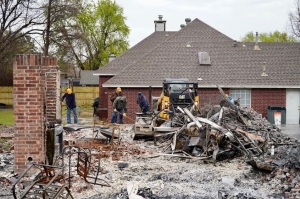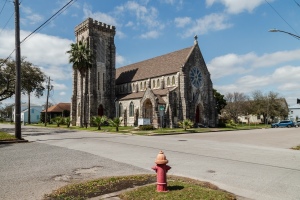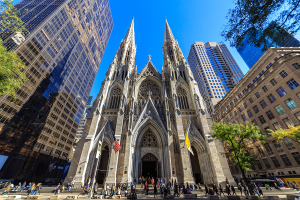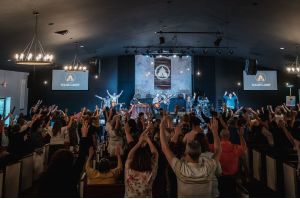La. Lawmakers Say 'No' to Ten Commandments
Members of the Louisiana Senate on Wednesday formally rejected a bill that would allow a Ten Commandments monument on the grounds of the state capitol.
The bill, House Bill 277, was voted down 5-2 because of reported concerns that the monument would be considered controversial and potential litigation over the display would be too costly for the state and taxpayers.
Members of the Americans United for Separation of Church and State said in a statement that a government-sponsored religious display, like the Ten Commandments monument, would divide Louisiana residents and possibly lead to litigation.
"We are very pleased that the committee decided not to waste taxpayers' money on a lawsuit over the Ten Commandments that the state was likely to lose," said Joe Conn, a spokesman for Americans United for Separation of Church and State.
The rejection of the bill follows a decision by the Louisiana House of Representatives to support the building of the monument.
Supporters said the measure was modeled on a Commandments display at the state capitol in Texas that survived review before the U.S. Supreme Court
Earlier this month, lawmakers said posting the Ten Commandments was also a statement of historic law, so it was fitting to make such a statement outside the building where laws are made.
“I think we have gone too far with the rejection of this bill,” said John Lawry, a longtime Louisiana resident.
“I have been following this legislation and many people thought it was a great idea to get back to the roots of our nation, which is under God. It is shameful that our lawmakers voted it down because they are afraid of a lawsuit.”
The text of the monument was to be built according to the specifications of Van Orden v. Perry, a Supreme Court case that ruled a Ten Commandments monument in Texas to be constitutional.
In a letter to Sen. Robert W. “Bob” Kostelka, chairman of the Committee on Senate and Governmental Affairs, by the Americans United for Separation of Church and State President Dr. Thomas J. Hannie, the group wrote, “The factors that were used to decide the Texas case were not specific to the monument itself, but rather to the conditions surrounding it.”
For example, he wrote, the Texas monument in Van Orden had been standing for 40 years before being brought to the court, whereas House Bill 277 would have created a brand new monument in the Baton Rouge capitol.
This, along with other arguments, showed that "the passage of the bill could result in a costly lawsuit, for which Louisiana taxpayers would be forced to pay.”
The letter also stated that posting the Ten Commandments on the grounds of the state capitol ”would authorize the government to place a religious text that is sacred for only some religions on the state capitol grounds-a place where tens of thousands of Louisianans come every year to petition their government and learn about the history of the state. By doing so, the legislature would send a message that those who are non-believers “‘are outsiders, not full members of the … community, and an accompanying message to adherents (particularly Jews and Christians) that they are insiders, favored members of the community.”
Hannie wrote in the letter that the Commandments are clearly a religious text. "Thus, government posting of the document amounts to state promotion of religion." Additionally, he pointed out that Christian and Jewish groups do not agree on the wording or listing of the commandments.
“Our arguments seemed to be convincing,” members of the Committee on Senate and Governmental Affairs said.
Rep. Patrick Williams (D-Shreveport) spearheaded the idea to erect the religious monument.
He authored House Bill 277 saying the legislature every day opens its sessions in the House and Senate with a prayer and the Pledge of Allegiance.
He said his decision to push the legislation was influenced by a recent visit to the Middle East, where he climbed Mount Sinai, where Moses got the Ten Commandments.
Williams said religion plays a part in government.
"All denominations are allowed to pray,” he said.
Williams told committee members that the state attorney general’s office approved the language in the bill.
He also told fellow lawmakers the monument would be on Capitol grounds among the other sites and markers on the 27 acres near the statehouse, which includes the grave of former Gov. Huey Long and a historical marker designating the former location of Louisiana State University.
"This is for historical purposes, not religious purposes. It shows the effect of the Ten Commandments on history and laws,” Williams told lawmakers.
The bill would have used private donations to erect and maintain the monument.
Members of the Louisiana Baptist Convention testified earlier in this week's session it would help raise money for the monument and defend it against any lawsuit that might be filed.
Williams was asked in a recent interview about separation of church and state.
“When prayer is a part of everyday operations, how do you determine what separation is?” he said.
He said his bill actually puts into action something that was started in 1950.
“The legislature created a law allowing for the posting of such markers on the Capitol grounds, but no one ever asked for it to be done," he said.
"I'm asking."
Voting to kill the bill were: Sens. Karen Carter Peterson (D-New Orleans), Dan Claitor (R-Baton Rouge), Lydia Jackson (D-Shreveport), Rob Marionneaux (D-Livonia), and Edwin Murray (D-New Orleans).
Voting for the measure were: Sens. Jody Amedee (R-Gonzales) and Mike Walsworth (R-West Monroe).
The bill is dead for the session unless Williams can graft it onto another measure that is still alive in the House or Senate. Citizen groups, after hearing about the rejection of the bill, said protests will be held in the coming weeks to convince lawmakers that the Ten Commandments should be posted on the grounds of the state capitol.
On the Web:http://senate.legis.state.la.us/SessionInfo/





























